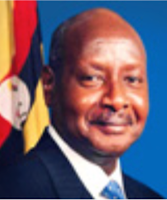
Yoweri Kaguta Museveni
YEAR OF MATRICULATION: 1967
EDUCATION:
Born in 1944, during World War II, in Ntungamo in Ankole, Uganda Protectorate, to parents Mzee Amos Kaguta (1916– 2013), a cattle herder, and Ma Esteri Kokundeka Nganzi (1918–2001), a housewife. The world war was the source of his own personal name ‘Museveni’: one born at the time of the military service of the Seventh Regiment of the King’s African Rifles. He went to school to Kyamate Elementary, Mbarara High and Ntare Schools which, being among very few prestigious mission or else privately-sponsored character- building institutions, must have formed his early base of character formation and resilience built a strong foundation for the intellectual and ‘scouting’ feats of his later part of life.
Yoweri Kaguta Museveni enrolled in the University of East Africa at Dar es Salaam in 1967, graduating in 1970 with a BA (honours) in political science and economics. It was while at Dar es Salaam that he forged alliances with other politically active “revolutionaries” from around the region. While he was truly a good student there – in political science and economics, it might well be said that a greater share of his learning was perhaps not directly as much from his college lecturers as it was from the ‘great revolutionaries’ outside of classroom, of the stature of Marx, Lenin, Fanon, Mao and Castro. In a second order would be Western liberal- radical thinkers such as Galbraith. He became not only a seasoned ‘guest-fighting intellectual’ in liberation movements such as the FRELIMO but also a practising politico-economist of the persuasions of Galbraith and others (in advocating a “new socialism” that prefers small, farmer-sensitive firms over large competitive corporations, favours nationalising military production and public services such as health care, as well as introduces disciplined wage, salary and profit and price controls on the economy so as to reduce inequality and restrain the power of giant corporations). Whenever on university vacations he would partake in combat and striker camps inside Mozambique territory but also play part in what were known as ideological classes that would be
held often on Sundays to replace the religious liturgies. He later adapted his own intellectual posture in nation-building efforts to a balance of these two seemingly parallel lines, moderated, as came to be, by a pragmatic criss-crossing blend of ground-tested pragmatic experiences. His dedication and singular mindedness to the economic progress of his country and the well-being of its citizens has remained steadfast. He went to the bush for the sake of the people who had been downtrodden and dispossessed for a long time, he would remind the people and himself.
While over the years he has found some time to visit his Alma Mater notwithstanding his busy schedules?and UDSM fully thanks him for that?President Museveni has also found time to jot down his reflections for wider dissemination on the experiences Africa has had at various times in her history and to offer ideas on how our region can make headway. Sowing the Mustard Seed: The Struggle for Freedom and Democracy in Uganda, published and reprinted since 1997 and What is Africa’s Problem? (ed. by Kevin Shillington, University of Minnesota Press, Library binding, 2000) are not only an interesting read but also a stimulus to even wider questions in need of answers. Yet at the cultural-linguistic level of national development, President Museveni has authored a book, Katondoozi: A Thesaurus of Runyankore-Rukiga (2019), written in an indigenous African language and making what Makerere’s Prof. Elly Sabiiti, in a Citation for the Outstanding Scholarly Authorship Award, recognised as a “complete granary for the Runyankore-Rukiga” displaying the “rich and unique vocabulary” of an African language.
In 2011, in an interview with BBC, he said that he wanted to leave two things as his legacy: A clearly evident socio- economic transformation of Uganda that headed towards turning the country into a first-world state; and an East African Federation. Let’s join him in hoping for the realization of this wish.

